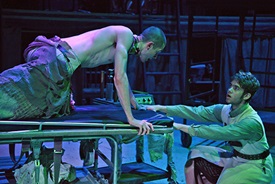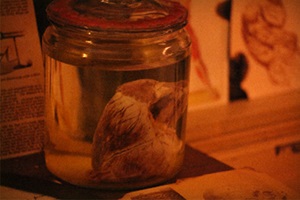Topic: College of Fine Arts
October 9, 2015

Michael Elliott
(left) and Drew Vidal hope to adapt their original movement and music for
"Frankenstein" for festival audiences. Their project won Ball State's
2015 Outstanding Creative Endeavor Award.
Just as Dr. Victor Frankenstein blended body parts into a creature, two would-be doctors in Ball State’s theater and dance department worked with students to blend original movement and music into a new "Frankenstein."
The joint production by Assistant Professors Drew Vidal and Michael Elliott gave undergrads a rare opportunity for creative expression, provided students with an entrepreneurial learning experience and earned national awards.
In the future, the winners of the 2015 Outstanding Creative Endeavor Award hope to scale down the production to a length and cast size that would appeal to theater festivals. Or maybe take it to a professional theater.
Unlikely starts
Both men planned to go to medical school after college, initially majoring in engineering (Elliott) and math (Vidal).
Elliott's epiphany came while touring with his college choir. "I realized I'd skip a calc or chem class in a heartbeat, but I’d never miss rehearsal." He switched to vocal education, and grad school led him to teaching musical theater.
"It's really asking students and faculty to work together in a way that
is improvisational and problem-solving on its feet."
— Wendy Saver
associate professor of voice and acting
Vidal has a lifelong love of acting, but "even in college, I didn’t necessarily take it seriously as a career path." Still, he wound up with an acting degree, moved to Chicago and acted, supplementing that by also working as a fight director.
He started to discuss creating and teaching safe, repeatable stage fighting with, "When there's violence on stage, I …"
Elliott chimed in, "He causes it."
They both laughed.
Such ease comes from familiarity, but they'd only briefly worked together before "Frankenstein." When Vidal brought his idea of the original, movement-based version to a departmental committee that Elliott served on, Elliott's interests in "Frankenstein" and new musical theater stirred. He thought, "Well, if I'm going to do that here, I need to try to jump on."
Thus began their grand experiment—a scary yet invigorating adventure.
A creative pas de deux
Elliott started crafting bits of musical themes and variations, which Vidal and about 15 students used to begin creating movement in a May 2013 workshop.

Frankenstein brings his creature to life in Michael Elliott and Drew Vidal's rendition of the classic gothic novel.
While students were eager to be cast, Vidal wanted to ensure they were prepared for two months of intense work that fall.
"I said, 'Listen, everyone's going to be here every night. You have a hand in building this. You're part director, part actor, part writer—for your material and for others' material.'"
That fall, small pods and larger groups tackled scenes he'd picked. "How does Victor create the monster? How does he interact with the monster?" Vidal said crisply, articulating each consonant. "Different pods might work on the same thing."
With two faculty members, two student assistant directors and a student dramaturg (who researches and helps develop a work), five groups could create at once.
"We'd all get back in the room, and if one group came up with a morsel that was interesting, we might take it away from them and give it to another group to continue working on."
As acting progressed, Elliott got video of, say, a five-minute scene that had been worked on that night. "I'd immediately score something, and it either would fit or it led me to something else." At other times, storytelling was borne of his sounds.
The soft-spoken Elliott also worked with five musicians, relying on them to create some effects, including scratching. The quintet adjusted to scores that changed, even after the show opened.
Those revisions were exciting for cellist Art Hill. "Every time we played it, it was slightly different," said the senior manager of interactive marketing in the Division of Strategic Communications. "It wasn't static. It was a living, breathing thing."
Others—from the cast and crew to the department—made similar accommodations for the unknown.
A collaborative monster
Photo Gallery

See the display student dramaturg Lin Hart assembled in the Strother Theatre lobby to enhance
the production of "Frankenstein."
View gallery.
The chance to gain significant experience as an undergrad led dramaturg Lin Hart to
study theater at Ball State.
"Since Ball State only has an undergraduate program, I got to jump in as a freshman to do things and have the skills, as a junior, to execute this," said the Bloomington native, who graduated with a theatrical studies major and now teaches in the department.
"I got a lot more attention from our dramaturgy supervisor, Dr. Tyler Smith, and got to work more closely with Drew and Michael because they didn't have a grad student there to call on. I'd rather be baptized by fire than not baptized."
The connections between students' learning processes and Vidal's interest in the story created interactions that aren't traditional at universities, said Wendy Saver, an associate professor of voice and acting who's on leave this year.
"It's really asking students and faculty to work together in a way that is improvisational and problem-solving on its feet. You're figuring it out as a team, as collaborators. You create it together."
Big risks—and rewards
Was the compressed creative schedule scary for the student who played the monster?
"If you don't buy into it, in eight weeks you're standing in front of an audience with nothing," said Nick Murhling, a theatrical studies and telecommunications major from Fishers, Indiana.
Awards for 'Frankenstein'
Seven people associated with "Frankenstein" received accolades, regionally and nationally.
See the awards they won.
There were other challenges. He had to learn to use his body as an acting tool, got help from Vidal and cast mates to build his character and adjusted as dialogue and scenes changed until a week before opening.
"It's also freeing,” said the senior who hopes to get into professional acting. "This creation is entirely yours. It's an embracing of the unknown. I'm grateful to Drew for both guiding me and encouraging me to take it where I felt the creature would go.
"It's the one experience I've had here that I'll carry with me into the real world and share with future creative partners."
Such entrepreneurial learning and creativity are spurred by the department's professors, said Chairperson Bill Jenkins, who's very proud of "Frankenstein."
"This further solidifies our place in higher education in new works development and in the country in new works development."
A very successful experience
"Frankenstein" is Vidal's and Elliott's proudest accomplishment at Ball State. Vidal wholly agreed with Elliott's comments:
"I think it encompasses everything—the students, the work they did, the collaboration we had and personally, overcoming the challenge of something I've never, ever done before. Not even remotely have I composed a full score, let alone in eight weeks. That's a little selfish, but the whole project is a microcosm of everything.
"When we do good shows, having students perform at a high level, seeing what they accomplish, that is always amazing."
 Explore Theatre and Dance
Explore Theatre and Dance
Do you want to step into important roles, on stage or off, like Michael Elliott and Drew Vidal had their students do?
Learn more about Theatre and Dance.
By Judy Wolf, Communications Specialist